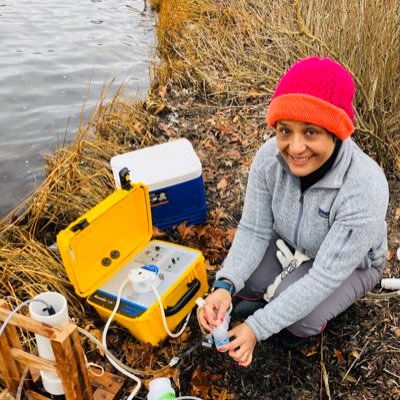Professor Soni Pradhanang dedicates career to water science
Department of geosciences professor, Soni Pradhanang, shares her passion for water science. Photo Courtesy of Soni Pradhanang.
Professor Soni Pradhanang wears many, many hats.
In her sixth year at the University of Rhode Island, Pradhanang is an associate professor in the Department of Geosciences teaching courses like Innovative Subsurface Remediation Technologies, Introduction to Water Resources and Geospatial Watershed Modeling. She is also the director of the global water resources minor program, a water quality scientist and hydrologist, teaches graduate level courses on climate change with a focus on hydrogeology and is an undergraduate adviser.
According to the College of Environment and Life Sciences, her research focuses on “the development of decision support systems for management of water resources from field to the watershed and regional scale.”
Professor Pradhanang said her interest in water science has evolved over time.
“I have always been interested in learning about the environment,” she said. “When I was young, I didn’t know what I wanted to be. I had too many interests, but as I started going deeper into subject material and about the environment, I started getting interested.”
Pradhanang credits the start of her deep dive into the study of water to an opportunity she received to present some of her work on water pollution to an international convention. One of her favorite things about the field is the diversity it has.
“Some people like to learn about the physics of water,” Pradhanang said. “Some people like to learn about [the] chemistry of water, some are [interested] in biology centric. I bring data from the field and lab and put it in models and then I do predictions based on what I see.”
Pradhanang is a native of Nepal, a country located in South Asia and second richest in availability of global water resources. Much of her research involves the climate and water availability to the public in countries like India, Pakistan and Bangladesh. She has studied the increasing scarcities of the water supply in South Asia, pollutants in the river systems and the effects of urbanization on the water cycle and its ability to percolate into the ground.
“In the context of South Asia, there is management and there’s rules and regulations in place, but not everybody will follow [them],” Pradhanang said. “Probably because people are poor and they’re living in a condition where they really cannot follow rules.”
Pradhanang said the importance of communicating findings on water quality and pollution look different in every community.
“If you go into rural villages they will tell their own version of [this] story,” Pradhanang said. “They might have some perspective on how the weather has changed over time. There are ways to learn science and there are ways to learn communication and I feel like it’s very important that we communicate science properly if you want to make a difference.”
One of her biggest passions is being able to effectively communicate water and earth science in a “language that everybody can understand,” not just in numbers and graphs. Pradhanang knows not everyone comprehends science the same way. She believes the findings of her research and many other studies are an essential part of the general public’s ability to maintain a safe, healthy life.
“Water is a resource that everybody needs at different levels,” Pradhanang said. “Not just for drinking, [but also] for recreation and for many other uses, consumptive uses. Not everybody has to do the science, not everybody will do the science, but the importance of water resources, how things are happening in terms of climate, is important.”
Jordanne Feldman ‘19, a former student of Pradhanang, said she is the type of professor who always goes the extra mile.
“She opened my eyes to everything the water world has to offer,” Feldman said. “She’s so personal, and outside of class her door is always open. She helps you with anything you aren’t understanding and works [with you] through everything. She wants to talk to you about your specific interests.”
When she’s not teaching in the classroom, or via Zoom, Pradhanang enjoys being directly hands-on in her field of study. When she was a graduate student, she would storm chase to gather samples. While completing her Ph.D. in upstate New York, she would oftentimes collect data from snow as well. She believes that developing lab and field skills in an essential aspect to a study in water.
“You gotta have some lab skills,” she said. “Everybody knows how to use a computer these days. You want to get wet and really feel like ‘wow, it is outside, this is the real situation.’”
Pradhanang attributes a great portion of her love for teaching to her students. She said that over the years, she has learned a lot from them and even goes as far as to call herself a “lifelong learner” because of her continuing process of learning how to translate science to the public language.
She says that she tries to live by the famous Bruce Lee quote in which he encourages a life of constant growth, change and flexibility: “Be like water.”





